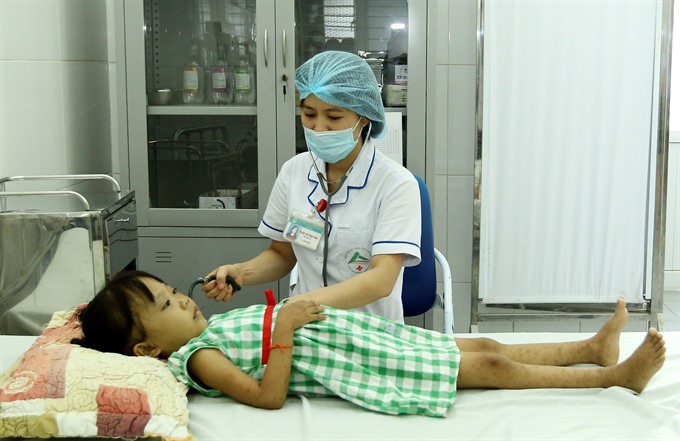 Society
Society

Costs have been cut for 70 healthcare services at hospitals and clinics nationwide following a circular that took effect on Sunday. Patients will now pay anything from 5 to 50 percent less for dozens of services.
 |
| A nurse checks on a child at Lào Cai General Hospital. Patients will now pay anything from 5 to 50 percent less for dozens of services. — VNA/VNS Photo Quốc Khánh |
HÀ NỘI — Costs have been cut for 70 healthcare services at hospitals and clinics nationwide following a circular that took effect on Sunday. Patients will now pay anything from 5 to 50 per cent less for dozens of services.
For many few patients and their families, the decision is welcome news.
Lê Thị Út from the Mekong Delta Province of Tiền Giang is a relative of a patient being treated at Trưng Vương Hospital, and is happy with the price cuts.
“For poor people, health insurance only covers part of hospital fees. Thanks to this fee reduction, it won’t cost us as much,” she told Vietnam News Agency.
According to the new circular, fees for six services at five levels of hospitals and communal clinics have fallen by 17 per cent on average.
Bed fees have been cut by 2 to 10 per cent, depending on hospital class.
Examination fees have fallen by 15 to 20 per cent, or about VNĐ4,800 to 5,900 (US$0.21 to 0.26) for each examination.
Adjustments have also been applied to technical service fees such as X-rays, MRIs, CT scans, and PET CTs at all hospitals and clinics.
Other services will also see sharp reductions, including amygdala surgery which will fall to VNĐ2 million ($87) from VNĐ3.6 million ($157).
Nguyễn Nam Liên, head of the Planning and Finance Department under the Ministry of Health, said that the reductions aimed to create a more stable healthcare insurance fund and improve the capacity of hospitals at grassroots level.
“These fee reductions will share the financial burden on patients and the health insurance fund,” he said.
But Phan Thị Tình, a retiree living in Tân Bình District in HCM City, is worried that the move will have an impact on the quality of medical services.
According to the new circular detailing healthcare fees, the maximum number of patients allowed in each examination room per day has increased from 40 (as stated in the previous circular) to 65, which means examination times for each patient will be cut.
According to the health ministry, health checks should take a compulsory ten to twelve minutes.
However, if each room now has to examine 65 patients each day, the time for each patient will drop to seven minutes.
“Each doctor will have to examine more patients, which means I will have to wait longer and the exam time will be less,” Tình said.
According to Dương Tuấn Đức, director of the Centre for Health Insurance Appraisal and Multi
“Health-check fees have fallen by VNĐ4,800-5,900, but the time patients will get with doctors has also been cut. I don’t think patients are happy with the adjustment. They care about quality rather than quantity,” he said.
Diệp Bảo Tuấn, deputy director of the HCM City-based Cancers and Tumours Hospital, said that due to the higher number of patients (2,500 patients visiting the hospital for health check-ups, 1,200 inpatients and some 9,000 outpatients), the hospital would have to open check-up services from 5am every day.
“Based on the state of each patient’s health, we will decide how long we spend with them,” he said.
Hospitals suffer
Tuấn raised concern that profits at autonomous hospitals would fall due to the adjustment.
HCM City’s Cancers and Tumours Hospital had invested in costly endoscopy equipment, but now the cost of an endoscopy was less than open surgery. The hospitals should be compensated for that loss, he said.
Trần Văn Khanh, director of HCM City’s District 2 Hospital, said that the hospital had estimated it would lose VNĐ10-12 billion each year.
Without that budget, it would be difficult to operate and maintain equipment, pay staff wages and invest in hi-tech services, he said.
District 2 Hospital and other local hospitals have asked the municipal Department of Health and People’s Committee to offer support policies.
"The health ministry should decide on fees so that hospitals have enough money to maintain operations. Hospitals can only invest in new equipment and staff training when they operated well and earned a profit,” Khanh said.
Deputy Health Minister Phạm Lê Tuấn said the adjustment was an opportunity for hospitals to improve their administrative procedures and effectiveness while applying technology to minimise expenses.
The health ministry had taken into account three elements before it issued the decision: health exam fund sustainability, patients’ budgets and ensuring the operation of healthcare facilities, he explained.
If State policies made it difficult for healthcare facilities to maintain their operation, they would receive support from the State budget, the deputy minister said.
“First and foremost, hospitals must cut unnecessary expenses without damaging the standard of healthcare they provide,” he said. — VNS




